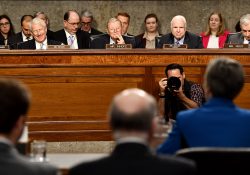Licensing NIH owned patents and data, including KEI comments on proposed exclusive licenses
(More on government funded inventions here) 2015 2015: Virotas Biopharmaceuticals. KEI and Public Citizen ask NIH for safeguards in license for HCV patents, April 14, 2015. 2015: NIH refuses to give information about principals in company seeking exclusive license to… Continue Reading



 Senator Angus King proposed an amendment to National Defense Authorization Act (NDAA) that would require the Department of Defense (DoD) to authorize third parties to use inventions that benefited from DoD research funding, when prices exceed the median price charge in the seven largest economies with per capita incomes at least half the per capita income in the United States.
Senator Angus King proposed an amendment to National Defense Authorization Act (NDAA) that would require the Department of Defense (DoD) to authorize third parties to use inventions that benefited from DoD research funding, when prices exceed the median price charge in the seven largest economies with per capita incomes at least half the per capita income in the United States. 
